Home > Further Information > Technical Advisors System
Technical Advisors in Intellectual Property Lawsuits
- What is the technical advisors system?
- Why are technical advisors helpful in intellectual property lawsuits?
- How many technical advisors have been appointed so far, and in what fields are they specialized? How many technical advisors have participated in court proceedings?
- What status do technical advisors have?
- In what kind of procedures do technical advisors participate?
- How are technical advisors assigned?
- How do technical advisors differ from judicial research officials and expert witnesses?
- What is "explanatory session" and what do the technical advisors do?
- In what kinds of cases are explanatory sessions held?
- Is the explanation provided in an explanatory session recorded?
- What would be helpful reference to gain a better understanding of technical advisors?
- How will the technical advisors system be utilized in intellectual property lawsuits?
- What is the technical advisors system?
- The technical advisors system was established by the amendment of the Code of Civil Procedure in 2003 and introduced into practice in April 2004. This system aims at achieving higher quality of court proceedings and judgments in specialized fields of lawsuit such as intellectual property cases, in which scientific and technical matters are often disputed. Under this system, experts who have a wealth of knowledge in relevant scientific fields are asked to participate in court proceedings as technical advisors. They provide judges and parties, from the viewpoint of a fair and neutral adviser, with explanations on the technical matters involved in the lawsuit. These explanations are helpful for judges to have better understanding on the technical aspects and to narrow down legal and factual issues of the case.
- Why are technical advisors helpful in intellectual property lawsuits?
- In intellectual property lawsuits and in particular patent cases, issues often relate to complex and highly advanced technology. Technical advisors participate in court proceedings of such lawsuits and provide explanations, from a fair and neutral viewpoint, on the technical matters at issue, based on their expertise in their respective scientific fields. By doing so, they assist judges in conducting proceedings and making decisions more accurately and expeditiously. The contribution of technical advisors is also expected to enhance public confidence in judicial determination on intellectual property issues.
- How many technical advisors have been appointed so far, and in what fields are they specialized? How many technical advisors have participated in court proceedings?
-
Technical advisors in the field of intellectual property lawsuits are appointed from among leading experts nationwide, including university professors and researchers in the area of cutting-edge sciences and technologies. We have around 200 technical advisors at present. They cover a wide range of scientific fields, including electronics, machinery, chemicals, information communication, and biotechnology. Courts designate the most suitable technical advisors from a wide range of candidates, on a case-by-case basis, considering the nature and content of the dispute.
By April 1, 2022, a gross total of more than 2,400 technical advisors have participated in court proceedings of intellectual property lawsuits.
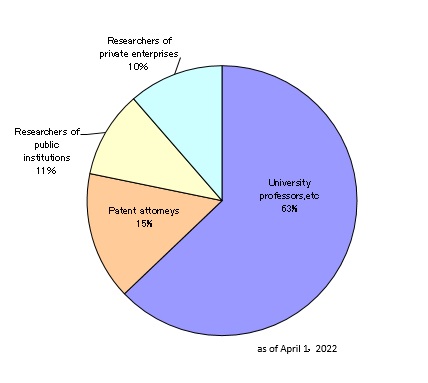
- What status do technical advisors have?
- Technical advisors are part-time officials appointed by the Supreme Court from among experts with scientific knowledge and experience. Upon appointment, they are given the status of court official. However, unlike ordinary court officials, they serve as a court official only when they are designated as technical advisors and thereby participate in court proceedings. Technical advisors belong to a court as designated by the Supreme Court, and the court designates and assigns technical advisors to appropriate cases. Their term of office is two years.
- In what kind of procedures do technical advisors participate?
-
Technical advisors, by the decision of a court, participate in either proceeding for clarifying issues and evidence, evidence examination proceeding, or settlement conference. Among these proceedings, the advisors usually participate in the proceeding for clarifying issues and evidence, which is called “preparatory proceeding for oral argument” (benron-junbi tetsuzuki in Japanese, hereinafter referred to as “preparatory proceeding”), and provide oral explanation on technical matters in the proceeding.
In some intellectual property cases, “explanatory session” may be held to understand technical matters more adequately during a preparatory proceeding with technical advisors’ participation.
Flow of court proceedings
Court procedure starts with a filing of an action to the court. The parties present their arguments before judges, and through proceedings, factual and legal issues are clarified. Relevant evidence is examined, and oral argument is concluded when judges think that the case is ready for determining the merit. Finally, the decision is rendered. In intellectual property lawsuits, there are two types of litigation; civil litigation (infringement litigation) so as to determine the rights and obligations of parties, and administrative lawsuits seeking revocation of the board decisions of the Patent Office.
In addition to final judgment, a case is terminated by settlement reached between the parties, and withdrawal of a lawsuit is another way of termination.

Clarification of issues and evidence
This proceeding is to identify the issues by hearing arguments of both parties and to determine whether evidence submitted by the parties is relevant and necessary to resolve the dispute. Judges and parties also use this proceeding to discuss how to proceed with the case. This proceeding may be conducted in a courtroom, but usually in a room other than a courtroom (such as a conference room).
In some intellectual property cases, “explanatory session” may be held during this proceeding.
Examination of evidence
Through the examination of documents, witnesses, parties themselves, expert witnesses and objects for inspection, courts are given enough materials to determine the merit. In patent lawsuits, examination of witnesses is relatively rare.
Settlement
While the case is pending before a court, the parties may compromise to solve their dispute through negotiations, thereby terminating the lawsuit.
- How are technical advisors assigned?
- A court, when it finds necessary, decides that technical advisors should be involved in either preparatory proceeding, evidence examination proceeding, or settlement conference. Before the decision, however, the court is required to hear the parties’ opinions in the case of preparatory proceeding and evidence examination proceeding and to obtain consent of the parties in the case of settlement conference. Once the decision is made, the court selects suitable technical advisors from among those who belong to the court and assigns them to the case, considering the nature and content of the dispute.
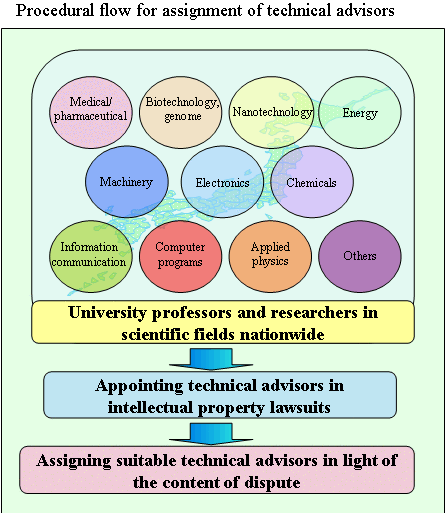
- How do technical advisors differ from judicial research officials and expert witnesses?
- In intellectual property lawsuits, technical matters are often at issue. In order to resolve such disputes fairly and expeditiously, courts have sought contribution and cooperation from various experts such as judicial research officials and court-appointed expert witnesses in addition to technical advisors. Judicial research officials are full-time court officials. Judicial research officials specializing in intellectual property cases have been assigned to courts, 11 officials to the Intellectual Property High Court, 7 officials to the Tokyo District Court, and 3 officials to the Osaka District Court. Those officials have expertise in various technical fields such as machinery, chemicals and electronics, and as ordered by the court, carry out necessary research on technical matters involved in patent, utility model and other intellectual property cases. From April 2005, they may, with the permission of a presiding judge, ask questions to the parties during oral proceedings so as to clarify the issues of the case (Article 92-8 of the Code of Civil Procedure). Unlike technical advisors who participate only in cases to which they are assigned, judicial research officials are supposed to participate in proceedings of all cases relating to intellectual property rights - such as patent rights and utility model rights—in which technical matters are disputed. In a dispute over highly specialized or advanced technology, both judicial research officials and technical advisors may participate in the proceedings. In such a case, technical advisors, who have expertise in specific technical fields, and a judicial research official, who has technical knowledge in general and is well versed in the patent/utility model prosecution procedure, work together to assist judges. Court-appointed expert witnesses provide expert opinions on specific matters as requested by the court, and their opinions may be adopted as evidence and relied on in the judgment. On the other hand, technical advisors participate in the proceedings as the court’s advisers and provide explanations on technical matters disputed in individual cases. Their opinions do not constitute a part of the evidence.
| Technical advisor | Expert witness | Judicial research official | |
|---|---|---|---|
| Status | Part-time court official | not a court official | Full-time court official |
| Term of office | Two years | No term | No statutory term in general |
| Remuneration | Allowance paid for each case | Fee for an expert opinion | Salary paid for full-time official |
| Possibility to be questioned by the parties | Not expected to be questioned | May be questioned on the expert opinion | Not expected to be questioned |
| Nature of explanation or opinion | Provide easy-to-understand explanations on scientific matters as the court's adviser. The explanation may not be adopted as evidence. | Provide expert opinion on specific matters as requested by the court. The opinion may be adopted as evidence and relied on in the judgment. | Carry out research on necessary matters as ordered by the court and report the research results. The research results may not be adopted as evidence. |
- What is "explanatory session" and what do the technical advisors do?
-
Explanatory session is a proceeding in which a court hears explanation on technical matters from parties. It is conducted on the date for oral argument or the date for preparatory proceedings for lawsuits seeking rescission of JPO decision and infringement lawsuits. A typical explanatory session held by the Intellectual Property High Court is as follows.
Explanatory session may be conducted at the final stage of preparatory proceedings or on the first date for oral argument. In addition to the judges and the judicial research official in charge of the case, three technical advisors who are selected from experts in the technical field relevant to the case attend the session. The technical advisors review the necessary documents and information from the case records prior to the session. In the explanatory session, each party makes a presentation for 30 minutes to one hour on technical matters such as the details of the invention, the prior art, and common general technical knowledge available as of the time of the filing of the application. Presentation software is often used to clarify points at issue with visual effects. Samples or video recording of the patent embodiment or defendant's product and the diagrams indicating correlations between the patented invention and the defendant's product by coloring the corresponding parts are also used in infringement cases. -
After the presentation, all the participants of the session will engage in a free discussion including questions to the party on the contents of the presentation or unclear points in the allegations and evidence, and the explanations on technical matters by the technical advisors. It is expected that the issues in the case are clarified and the understanding of the technical matters of the case are enhanced through this process.
Photos from explanatory session can be seen below.
- Photo 1: Explanatory session conducted on the date for oral argument.
- Photo 2: Attorneys for the plaintiff making a presentation.
- Photo 3: Attorneys for the defendant making a presentation.
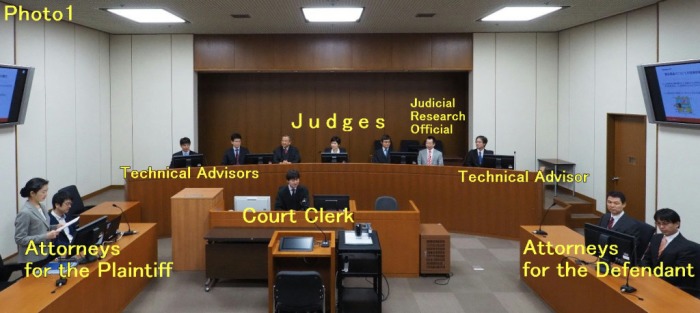
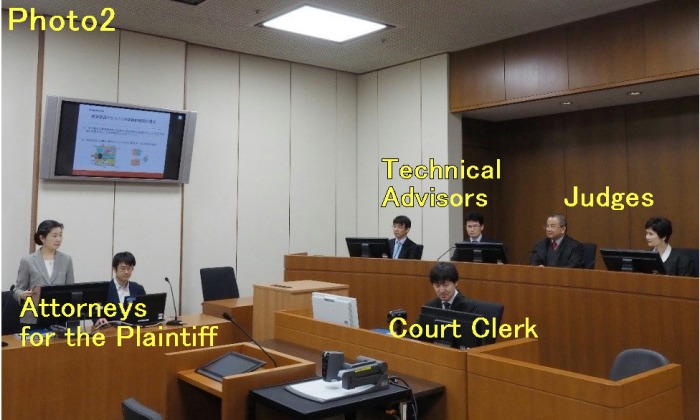
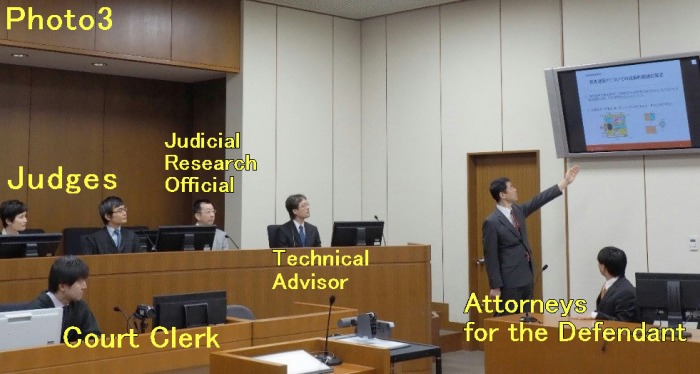
- In what kinds of cases are explanatory sessions held?
- Explanatory sessions are held not only for cases in which the issues relate to advanced or special technical fields, but also for a wide variety of cases in which it is considered appropriate for litigation to reflect the general understanding shared among those skilled in the art, or in which common general technical knowledge in the art becomes an issue.
- Is the explanation provided in an explanatory session recorded?
- The explanation provided by parties in an explanatory session is retained as part of the case records when the materials used to provide the explanation are submitted to the court as documentary evidence. On the other hand, technical advisors provide explanations with the goal of improving the court’s understanding of technical matters as its advisors. Their explanations do not constitute evidence and are therefore generally not included in the case records (see Q7). However, if explanations by technical advisors are necessary to clarify the issues in a case or for other reasons, additional measures to record them may be taken.
- What would be helpful reference to gain a better understanding of technical advisors?
- The procedures in which technical advisors are to participate, as well as the procedures for their assignment and appointment/dismissal are prescribed in Articles 92-2 to 92-7 of the Code of Civil Procedure.
- Introductions in English are available from the following articles (“Technical advisors” are mentioned as “expert commissioners”.) ; Katsumi Shinohara, “A Retrospective and a Prospective Look at the First Year of the Intellectual Property High Court” , Ryuichi Shitara, “A NEW TREND IN IP LITIGATION” , Ichiro Otaka, “Recent Developments regarding the Intellectual Property High Court of Japan”
- How will the technical advisors system be utilized in intellectual property lawsuits?
- In order to achieve more fair and expeditious proceedings and decisions on highly specialized and technical matters disputed in intellectual property lawsuits, courts will further promote the use of technical advisors and upgrade the technical advisors system, taking advantage of various occasions such as practical case-study seminars for technical advisors.